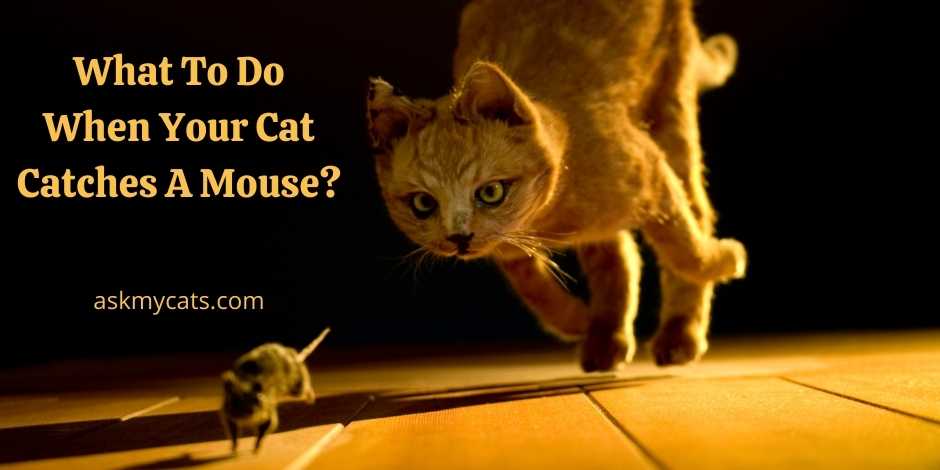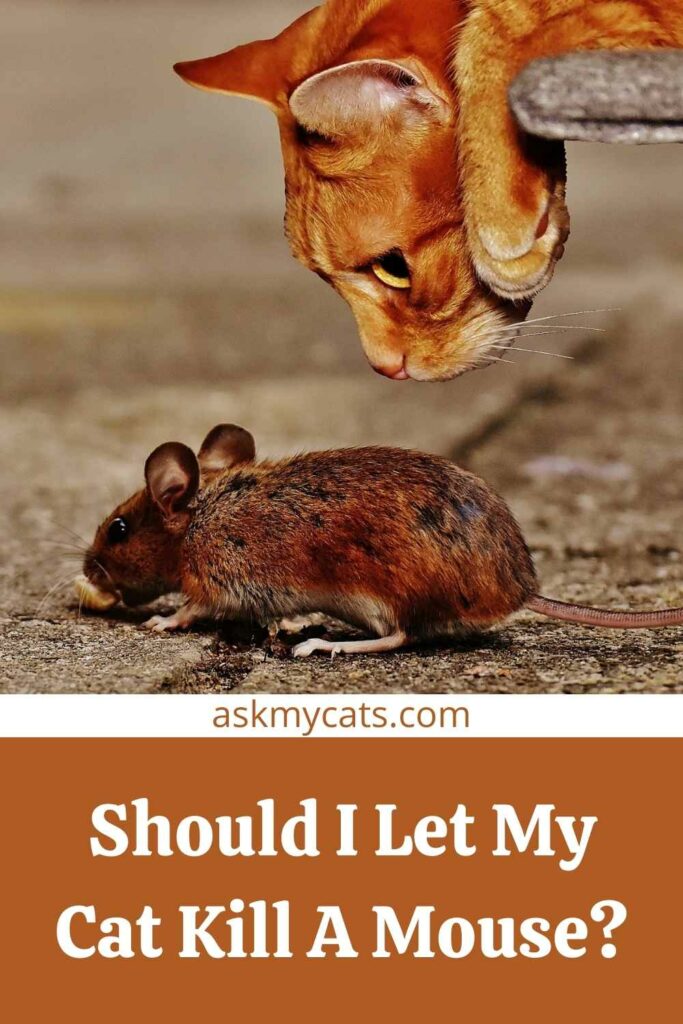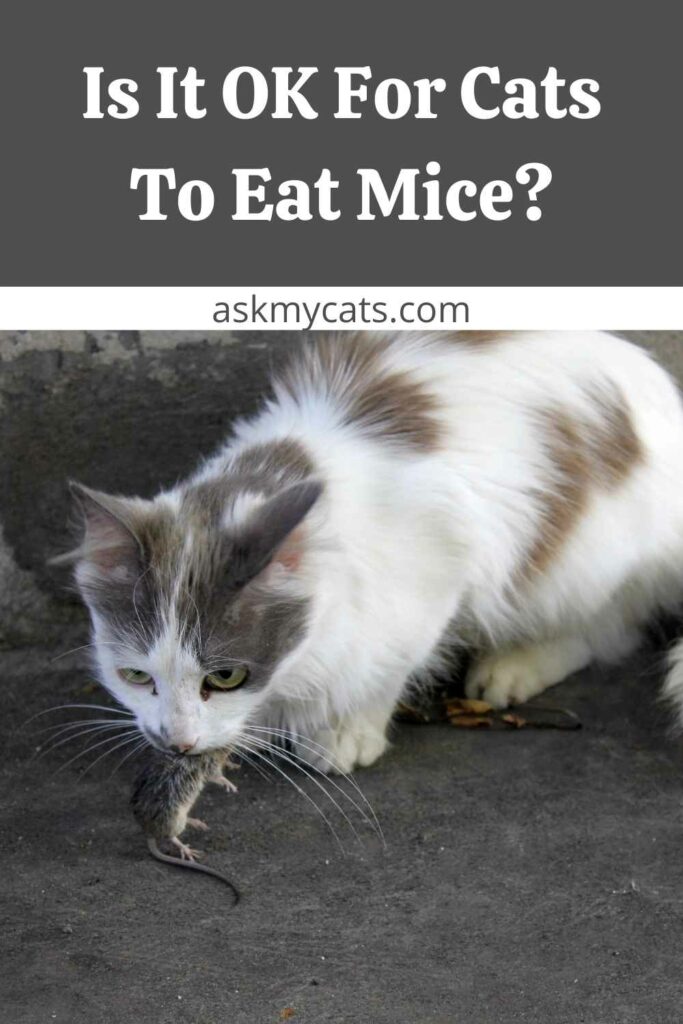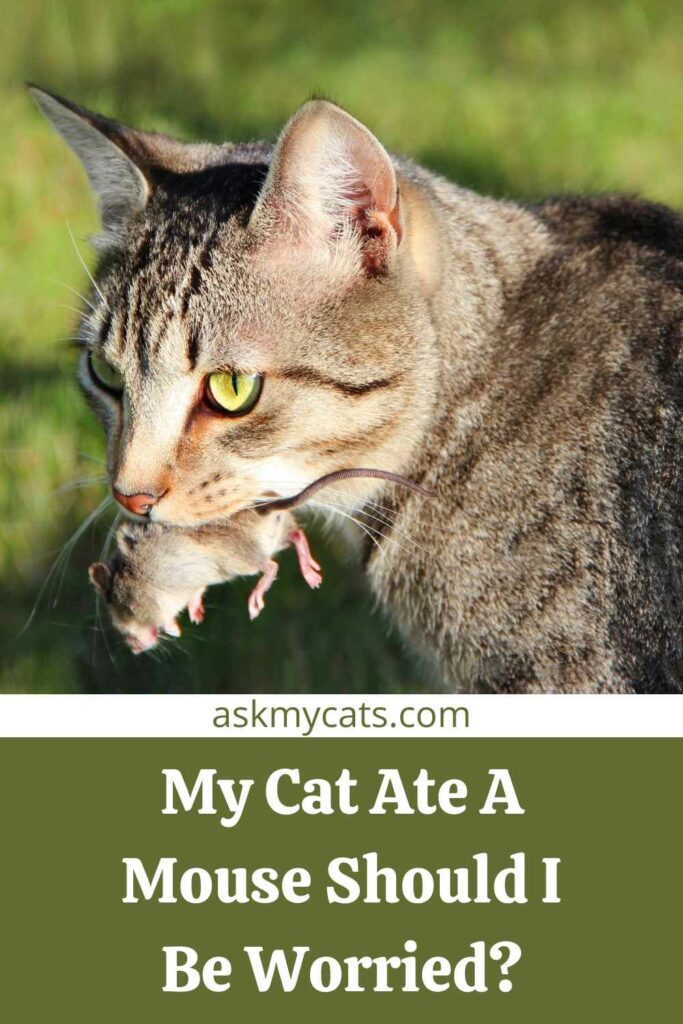The traditional cat and mouse chase is familiar to many cat owners, and you dread the day when your cat brings a dead mouse into your house. Mice are a simple prey for your cat, and their body size is ideal for them.
Normally, the mouse that your cat catches will be dead. As a result, you must remove it and sanitise and clean properly whatever it has touched.
Although killing a mouse may provide your cat with the excitement of a lifetime, it is unlikely that you would enjoy it as much. Let’s see what you can do if your cat accidentally catches a mouse and brings it to you!


Give Your Cat the Perfect Day
Get the Free Ebook!
Should I Let My Cat Kill A Mouse?
No, you shouldn’t let your cat kill a mouse because your cat might develop Lyme disease or pass it on to its owners.

Poison for mice and rats may not work right away. The poisons are usually consumed a few days before the mouse dies. If your cat catches a mouse at this time, the poison may be consumed along with the animal.
Even domestic cat breeds have an inherent hunting drive. In fact, some cat owners may consider it a favourable trait.
Cats may bring mice into the house to ‘show’ you how to hunt or gather food for you, according to one belief.
Another theory proposes that cats provide their owners prey such as mice as a gift. However, it’s also possible that your cat’s innate hunting instincts were triggered by the sight of a little mouse scurrying about.
Cats’ hunting instincts were formerly a popular pest management tool in many regions of the world.
As a result, your cat hunting mice isn’t always a negative thing. It may be upsetting and distressing for you, but it does not imply that your cat is violent or bloodthirsty. It’s a very natural reaction.
Cats have a strong urge to capture and hunt. This is why cats like toys that tease them, such as a streamer on a pole or a mouse toy held in front of their face.
Cats pounce on wiggling toes or fingers in their field of vision for the same reason. If they believe something is about to slip away from them, they become even more enamoured with it.
Outdoor cats, predictably, are more likely than indoor cats to catch prey and deliver it as a gift. However, if an indoor cat catches an adorable small thing, you can sure that they will seize the chance, just like their forefathers did.
Is It OK For Cats To Eat Mice?
It is not okay for cats to eat mice because they can catch various diseases.

One of the most serious issues is parasites. Your cat could be flea-free and parasite-free, but that mouse might not be. By eating a mouse, a cat can become infected with Roundworm. The larvae of these worms are found in muscle, but they dwell in your pet’s intestines.
This means your pet won’t have to consume the entire mouse. It’s possible that just biting into it may infect them. Worms can be difficult to eradicate. If you believe your cat has worms, contact your veterinarian right away to discuss treatment options.
This is one of the rare animal diseases that may be transmitted to humans. Your cat may become infected if it eats an infected mouse. In dogs, this is more dangerous, posing a risk of major health consequences, but in cats, it normally does very little harm.
If you have mouse or rat poison out, and the mouse eats it, there’s a potential your cat will get poisoned as well. The danger is determined by how long the mouse has been exposed to the poison and how much has been swallowed.
However, if your cat goes on a mouse-eating spree, she may accumulate enough poison in her system to cause a problem. If you suspect your cat has consumed mouse poison, contact your veterinarian right once.
Your cat’s danger is minimized if they are only capturing mice and not eating them. A well-fed cat will frequently give his catch to you rather than consuming it.
If you are concerned that your cat has been ill as a result of eating mice, take them to your veterinarian for an examination.
My Cat Ate A Mouse Should I Be Worried?
If you want to be safe, avoid allowing your cat to eat mice. Your cat may not become ill if they eat a mouse, but they may catch a sickness from mice.

Cats are natural rodent predators. Some cats are particularly obsessed in catching mice. Because our feline companions are so effective at capturing mice, many people have maintained or fed outdoor cats for many years.
People nowadays are considerably more likely to keep their cats indoors all of the time. Even if your cat is an indoor cat, it will have the opportunity to catch a mouse. Mice will migrate indoors in the fall, and if you have a cat, they will most likely be on the lookout for him.
Toxoplasma can make your cat sick and produce a variety of symptoms such as diarrhoea, pneumonia, liver disease, and nervous system problems. This illness can also be transmitted from your cat to you!
Roundworms are an intestinal parasite that a cat might get after eating a mouse. Roundworms may reside in your cat’s intestines and compete for the nutrients that they would otherwise consume.
Hantavirus can cause severe respiratory distress and pulmonary edoema very fast. It can also be transmitted to people; however symptoms may not appear for weeks.
Rickettsia pox creates an ulcer in the place where the mite bit you, as well as a fever and a rash all over your body and limbs.
Your cats may also be poisoned if they eat a mouse that has previously consumed poison. The same poison that kills mice might make your cat sick and possibly put their life in jeopardy.
You must closely observe your cat’s behaviour and health for anything out of the norm because you don’t know how your cat will respond or whether the mouse was unhealthy.
Keep an eye out for signs like vomiting, diarrhoea, or unusual behaviour. Contact your veterinarian right once if you develop any symptoms.
If you’re concerned but don’t detect any uncommon signs, contact your veterinarian. It’s better to be safe than sorry, because early treatment is crucial.
My Cat Caught A Mouse Will He Get Sick?
Cats can become sick from eating mice, so make sure you get rid of any gifts they bring you. Mice are disease, bacterium, and parasite carriers. By eating, biting, or playing with an infected mouse, your cat can easily develop any of these diseases. Eating a mouse that has been exposed to pesticide can cause secondary poisoning in cats, which can be lethal.
Cats are fantastic mousers. That’s why they’ve been employed in houses to help prevent insect infestations for years, if not millennia. Cat reflexes are well-suited to reacting to mice’s fast movements, scurrying noises, and darting tendencies.
In your contemporary house, though, it’s a good idea to keep your cat from eating its prey. Mice may be dangerous to your cat’s health, even if your cat isn’t aware of it.
It’s conceivable that your cat will get sick after eating a mouse. Mice can be infested with roundworms, which they can subsequently pass on to your cat. Mice can also contain the toxoplasmosis parasite, which can be transmitted to cats and ultimately to people via cat faeces.
It is not necessary to prevent your cat from hunting. It should not, however, be permitted to play with or consume any of the rodents it kills. Mice are infested with fleas, in addition to a slew of internal parasites including pinworms and tapeworms.
Fleas may carry a variety of diseases and parasites. As a result, even if your cat doesn’t consume the mouse, the carcass poses a risk, therefore get rid of it as quickly as possible.
Mice are known to carry up to 35 different diseases, all of which can be transmitted even after death.
My Cat Caught A Mouse And Is Growling?
If your cat successfully captures its prey in your house, it may become infected with these illnesses and will growl in pain.
Your cat might show symptoms in as short as a few hours, depending on what the mouse was carrying, whether it was a pesticide or an illness.
After the mouse has died, this becomes much more hazardous. Certain parasites and bacteria will flourish on the corpse while it decomposes, or they may look for a new host.
If your cat does not eat it right away, it may play with it. If you knock it around your house, the disease will spread and members of your family will become ill.
The cat will, at the at least, be spreading parasites, germs, and maybe insecticides across its play area. Even if the mouse is removed, the cat will remain in these regions and may become sick.
Should I Clean My Cat After He Catches A Mouse?
Yes, you need to clean and disinfect your cat because he may acquire some germs by killing a mouse.
Our cats may be cunning little felines at times, hiding their kills from us. As a result, the mouse will be mostly devoured by the time you find it. This might make you feel anxious, especially if you know mouse bait has been placed nearby. The first thing you should do is get rid of the mouse.
- Make sure the cat is in a different room and cannot witness you kill the mouse.
- To avoid direct touch, use gloves or put a plastic bag over your hand.
- Place the mouse into a plastic bag and throw it away.
- If you discovered it indoors, don’t forget to disinfect the place where you found it.
Look for any of the signs in your cat and inspect it. If any are present, see your veterinarian for advice.
Should I Take My Cat To The Vet If He Caught A Mouse?
When you discover your cat has eaten a mouse, you should seek medical advice as it will aid in the elimination of any illness possibilities.
The veterinarian can examine the cat and examine its faeces and urine to see whether it has been infected with parasites. He or she will prescribe the appropriate medications to keep the cat healthy and safe.
Rodents, such as mice, are known to contain a variety of illnesses that might infect your cat if it eats one. Many mice are afflicted with roundworms, which can enter the body of a cat.
Because mice contain the parasite that causes toxoplasmosis, the cat can get the disease from eating them. After killing and eating the mouse, it may also develop food allergies or stomach sickness.
Frequently Asked Questions
How long does it take for a cat to digest a mouse?
When your cat eats something, it normally takes 10 to 24 hours for it to pass through his digestive tract. However, certain things might take considerably longer – even months! Objects that are too large to pass through the digestive tract might produce a blockage.
Can cats survive eating mice?
A cat with exceptional hunting skills may be able to subsist solely on prey. However, for a variety of reasons, I do not advocate putting your cat outside on his own. Cats use more food than rats and mice, which are common and won’t be missed by many.
Can cats eat a mouse whole?
Cats can eat mice, but you’ll want to do something to keep your cat healthy and safe. Cats will eat mice whole, but they’ll leave little portions behind, such as the gizzard, because the gizzard is part of the digestive system and contains nothing helpful for cats.
Final Words
Your cat’s inclination is to kill tiny creatures. However, you should try to discourage this type of conduct as much as possible.
It may cause your cat to develop certain ailments. To prevent your cat from catching a mouse or other prey outside, keep it indoors the majority of the time.
Drop your questions in the comments section below.
